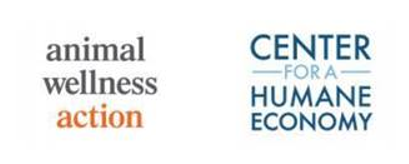



:quality(70)/cloudfront-us-east-1.images.arcpublishing.com/cmg/5WOTQDIP55FEJOUCK5ZAIMNE7M.png)



Animal welfare groups are advocating for their voices to be heard in the negotiations for the new farm bill, especially in light of California's new animal welfare law. A new law, Proposition 12, went into effect in California on January 1, 2024, mandating space requirements for pigs, cows, and chickens. It bans the sale of pork, veal, and eggs from animals that do not meet minimum space regulations. The U.S. Supreme Court recently upheld the law, ruling that it is constitutional. However, farmers and industry groups, such as the National Pork Producers Council and the American Farm Bureau Federation, are concerned about the impacts of the law. They argue that the requirements violate the Commerce Clause of the Constitution and compliance is estimated to cost $3,500 per pig. Manufacturers now face the choice of complying with the law or losing access to the California market. Additionally, 14 other states have passed similar legislation, prompting some to call for national legislation on farm animal welfare issues to create national standards. Animal-centered organizations, like Farm Sanctuary, are actively working to shape the farm bill by engaging with various organizations involved in the food supply chain. They believe that the animal-centered movement should prioritize food and integrate it with concerns for animals and factory farming. However, political gridlock and the influence of lobbyists and special interests have hindered the progress of the bill. The farm bill, which is passed every five years, is crucial for supporting farmers, communities, and the environment. The current trajectory of passing farm bills that favor corporate interests will lead to fewer farmers, greater consolidation, a worsening climate crisis, and a public health crisis. Animal-centered organizations aim to build inclusive and unifying food systems that benefit animals, people, and the planet. They believe that by working together, they can advance progress in animal welfare and other related issues. Animal Wellness Action and the Center for a Humane Economy have hired experienced individuals to advance animal welfare on Capitol Hill. Zach Bennett has been hired as Senior Policy Counsel and Don Green as Political Director. They will be working on the federal legislative team to advance Animal Wellness Action's federal policy and regulatory agenda. Both groups aim to promote legal standards against cruelty to animals and create a humane economic and social order. Wayne Pacelle, President of Animal Wellness Action, expressed excitement to work with Bennett and Green to pass legislation to crack down on animal fighting, end horse slaughter for consumption, end greyhound racing, and other national priorities. Bennett previously worked as a legislative counsel to Senator Rand Paul, focusing on health policy. Green is a former senior policy advisor to Congressman Vern Buchanan and has worked on various animal policy measures. Animal Wellness Action is a Washington, D.C.-based 501(c)(4) organization, while the Center for a Humane Economy is a Washington, D.C.-based 501(c)(3) organization.
Animal welfare advocacy in the farm bill negotiations
Farmers worried about impacts of California's new animal welfare law
Family Fights to Keep Chickens for Child with Special Needs Amidst City Code Enforcement Visit
A Concord family is fighting to keep their chickens after code enforcement visited them this month. The chickens have been emotionally beneficial for their 11-year-old son, Nathanial, who has a rare brain malformation. The family checked the City of Concord's rules and believed it was okay to have chickens. They are now exploring two options: asking the city to rezone their land to agricultural or asking the city council to change the rules to allow other families without farms to have chickens as well. Previous attempts to allow chickens in the city have been denied by the city council.
Source: Civil Eats [789121bd]
Animal welfare advocacy in the farm bill negotiations
Source: Nation World News [08e8f9f9]
Farmers worried about impacts of California's new animal welfare law
Source: EIN News [2e70f599]
Family Fights to Keep Chickens for Child with Special Needs Amidst City Code Enforcement Visit
Source: WSOC Charlotte [493b4b91]
Recently, the North Dakota Legislature allowed corporations to farm livestock in CAFOs. CAFOs have greatly improved animal health and comfort, but not all CAFOs are appropriate for North Dakota. Buffalo and cattle have been integral to North Dakota's agricultural system and culture. The expansive space and arid climate of North Dakota provide a great environment for cattle feedlots. In contrast, pigs are not native to North Dakota and require significant care, housing, and feed input for production. Pigs in corporate CAFOs are born, bred, and raised to slaughter weight within the corporate facility. Pigs contribute nothing to soil health and require a workforce often filled by migrant workers. The last hog processing facility in Minot closed in 2011, so the corporate pig CAFOs will likely be farrowing facilities with the baby pigs being sent out of state for finishing and processing. The economic benefit for North Dakota goes to out-of-state corporations, while North Dakotans are left with waste, smell, risk, and the need to attract a transient immigrant workforce. The author sees zero benefit of corporate pig CAFOs in North Dakota. [b5d04051]
The French parliament has upheld a law that grants cows the right to moo amid noise complaints from residents in the countryside. Police receive hundreds of noise complaints about mooing cows every year from urbanites who moved to the rural countryside for peace and quiet. French Justice Minister Éric Dupond-Moretti noted that courts were being "clogged up" with disputes about cows mooing in the dead of night. The new legislation will no longer allow people to sue their farmer neighbors over noises such as crowing roosters, mooing cows, stinking pigs, the sound of tractors, or the smell of manure. Those disappointed with the sounds and smells of rural life can no longer take their neighbors to court over noises during the night if the work is legitimate. Those who choose to live near an existing farm, shop, bar, or restaurant cannot complain about noises or other inconveniences. The law was introduced to parliament last year by French Justice Minister Éric Dupond-Moretti. [b217cc37]
Southwest Farmers and Miyetti Allah, a cattle breeders association in Nigeria, have signed a memorandum of understanding (MoU) aimed at fostering peaceful coexistence and ensuring food sustainability. The agreement was signed at a day-long conference in Ibadan under the auspices of the Southwest Commodity Farmers Organization. The MoU signifies a commitment from both parties to collaborate in promoting food production and sustainability in the region. The National Chairman of the Cattle Breeders Association and Southwest Farmers emphasized the importance of identifying genuine herders and farmers within the region to enhance cooperation and mitigate conflicts. The Southwest Director of the Federal Ministry of Agriculture and Food Security advocated for the continued integration of technological solutions in agriculture to support farmers and enhance food production. [6bade472]
Utah's top equine sanctuaries and national advocacy groups have launched SAFEACT.org, a website that urges legislators to pass the Save America's Forgotten Equines Act (SAFE Act HR 3475/S 2037). The act aims to ban the export of American equines to foreign meat plants for slaughter and protect vulnerable horses. The website, created by EquineIQ and designer Allison Walton, allows constituents to easily voice their support for the ban by sending messages to legislators. Over 20,000 American equines are exported for slaughter annually, and the SAFE Act has the support of major equine sanctuaries, animal welfare groups, and equine advocates. The bipartisan bill currently has 223 cosponsors in the House of Representatives and strong bipartisan support in the Senate. [36cac7d0]